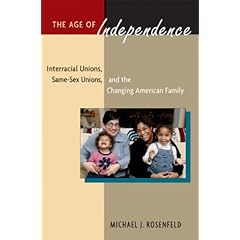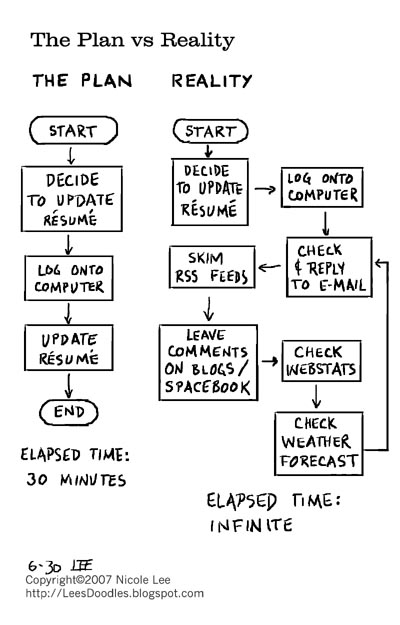1. Read Henry’s post on Facebook. Signed up out of curiosity and masochistic desire to have smallness of social network confirmed.
2. Joined the University of Arizona network. Noodling around, saw the profile for Joe Grad Student from my department. Looked at his list of friends.
3. Noticed that one of Joe Grad Student’s friends looked familiar. Realized I knew him. He had been a year ahead of me in Secondary School in Ireland in the late 1980s. Jaysus.
Like, it seems, umpteen others, I set up a Facebook profile for myself a couple of weeks ago. When I did, I found that plenty of friends from widely scattered parts of my social network had done the same thing, mostly around the same time. This does seem to me to be a genuine tipping phenomenon. I’ve been feeling a little guilty about not knowing more about Facebook and MySpace, given that I teach classes on how the Internet is changing politics and society. But I didn’t feel ready to actually set myself up, partly because I wasn’t sure what the point was, and partly because I was worried that I’d end up without any friends, exposed to the scorn and pity of the multitude. As my sister Maria said (before joining up herself and finding that she had lots of friends), Facebook is an opportunity to play the social game again – and lose. If other people shared our apprehension, it’s perhaps not surprising that lots of them have decided to join at the same time, when everybody knew that there were enough other people who they knew doing the same thing that the risk of public embarrassment was relatively slight.
Via Rebecca MacKinnon, this post by Mark Glaser has additional speculation on why so many lemmings plunged over the cliff at the same time, and why they plunged into Facebook in particular. I’d be interested to know why CT readers have or haven’t joined Facebook or other social networking type sites; I should also let people know that there is now a Crooked Timber group on Facebook (content currently consisting of a few photos of CTers mugging at the camera; more surely to follow).
Pejman Yousefzadeh isn’t taking the internet mockery of his anti-FDR agitation well.
Apparently–and this is the latest pronouncement from the Reality-Based Community–we are not supposed to study things that happened 74 years ago, or perhaps longer.
That seems like a reasonable way to characterize the point that one wouldn’t usually get worked up reading a squib entitled “70 years ago this week in monetary policy.” Anyhoo, [click to continue…]
For those in the Bay Area, I thought I’d mention that I’ll be giving a talk at Wiki Wednesday this evening at 6pm. The topic is digital media use by youth. Feel free to come by. Also, feel free to join the group at other times in the future, these meetings are held every month.
Writing about the LaRouche Youth Movement finally allowed me to use some of the research material piling up for a novel that’s never quite come together.
Maybe it was the anxiety of influence. Lyndon LaRouche always seemed like a character right out of Thomas Pynchon.
[click to continue…]
 The other day David Brooks wrote a column which appeared to be a stock piece of standard conservative anxiety about what he called “hard-boiled, foul-mouthed, fedup, emotionally self-sufficient and unforgiving” young women. Matt Yglesias picks up on on the piece today, salvaging the key insight of Brooks’ piece from the muddled pop-culture framing. As Brooks says,
The other day David Brooks wrote a column which appeared to be a stock piece of standard conservative anxiety about what he called “hard-boiled, foul-mouthed, fedup, emotionally self-sufficient and unforgiving” young women. Matt Yglesias picks up on on the piece today, salvaging the key insight of Brooks’ piece from the muddled pop-culture framing. As Brooks says,
bq. Now young people face a social frontier of their own. They hit puberty around 13 and many don’t get married until they’re past 30. That’s two decades of coupling, uncoupling, hooking up, relationships and shopping around. This period isn’t a transition anymore. It’s a sprawling life stage, and nobody knows the rules.
Matt comments:
bq. The reality is that technological and economic change has raised the age at which people — particularly more upscale people — do things like get married and have children. But biology stays the same. Consequently, people in their teens and early twenties engage in a lot of courtship-related program activities that don’t really entail a good-faith search for a spouse.
This point is basically correct. And for the past two months, a book exploring just this issue has been sitting on my shelf, waiting to be read properly, instead of skimmed. It’s Michael Rosenfeld’s The Age of Independence: Interracial Unions, Same-Sex Unions, and the Changing American Family.
[click to continue…]
